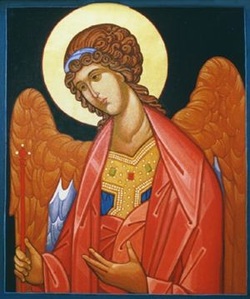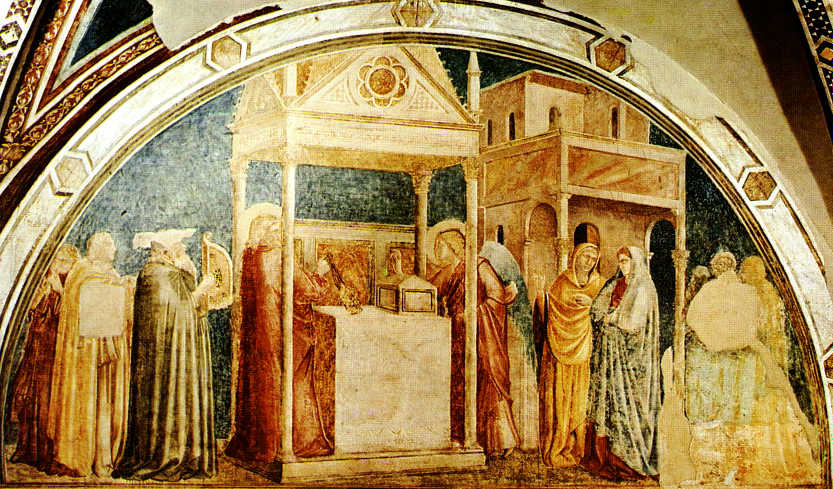
Sermon by St. Bernard the Abbot
Consider that this Angel was not one of lesser rank, even though such are, on one account or another, often sent on embassies to this earth. That he was an Angel of greater rank is indicated by his name which signifieth: Strength of God: and by the fact that he was sent, not by some Angel perhaps more excellent than he (as is usual), but from God himself. Therefore for this reason it is said: From God. Or, it might be for another reason, namely, lest it should be thought that God had discourteously revealed his counsel to any of the blessed spirits, except only the Archangel Gabriel, before he did so to the Virgin. For Gabriel alone was found so eminent among his compeers as to be held worthy both of such a name and message.
Neither do his name and his message disagree. For whom did it more behove to announce Christ, who is the Power of God, than him who is honoured by a like name? For what else is power than strength? Neither doth it appear to be unbecoming or unseemly that the Lord and his messenger should be known by a like title. Christ is called the power or strength of God in a very different sense from that in which this appellation is given to the Angel. In the Angel it is but a name. In the case of Christ, it is also an eternal attribute.
-----------------------------------------------------------------------------------------------------------------------
Sermon by St. Venerable Bede the Priest
The Angel saith that the prayer of Zacharias was heard, and then straightway promiseth that the wife of Zacharias should bear a child. We are not to understand that he had been praying for the birth of a son whilst he was offering the sacrifice according to the liturgy of that time, for we are told that he had given up hope of a son, and no one prayeth for that which he hath no hope of obtaining. Yea, so hopeless was he of ever having children of his own, because Elizabeth was barren, and they were both now well stricken in years, that he did not even believe the Angel's promise. Therefore the words of the Angel: Thy prayer is heard: refer to the redemption of the people, for which Zacharias had prayed in the pleading of the sacrifice. And the words: Thy wife shall bear a son: do shew the manner of that redemption, for he addeth that the son of Zacharias shall go before the Redeemer as a herald, to make ready his way amongst the people. Thus, in this saying that the prayer of supplication offered by Zacharias was heard of God, the Angel sheweth in what manner the people can be brought to salvation and perfection; namely, by repentance at the preaching of John, whereby they are to be led to faith in Christ.
But Zacharias hesitateth because of the sublime things which have been promised. Wherefore he asketh for a sign, that he may believe, albeit the coming of the Angel and his words of promise ought to have been a sufficient sign. Hence he was stricken dumb as a just penalty for his slowness of belief: to be dumb was both a sign to stir him up to the faith which he sought, and the penance which he deserved for his unbelief. We may thus understand that if a man of earth had promised such things, it would be lawful to seek for a sign, but that when an Angel is sent from heaven to give God's promise, there should have been no occasion for doubt. And yet the Angel giveth the desired sign, so that he who spake from disbelief may learn from silence to believe. Note that the Angel saith: I am Gabriel, that stand in the presence of God, and am sent to speak unto thee these glad tidings. Doubtless when Angels come to us they fulfil this active and outward ministry in such a way that they yet do always remain in God's presence by contemplation. Wherefore, they stand in his presence even though they be sent from him on a mission. An Angel is a created spirit, and therefore hath many limitations. But God hath no limitations, and is everywhere. Thus when he sendeth his Angels from his presence, they yet do stand therein, for whithersoever they go on a mission, they go in him. - This Feast of the Archangel Gabriel was extended to the universal Church by Pope Benedict XV.





